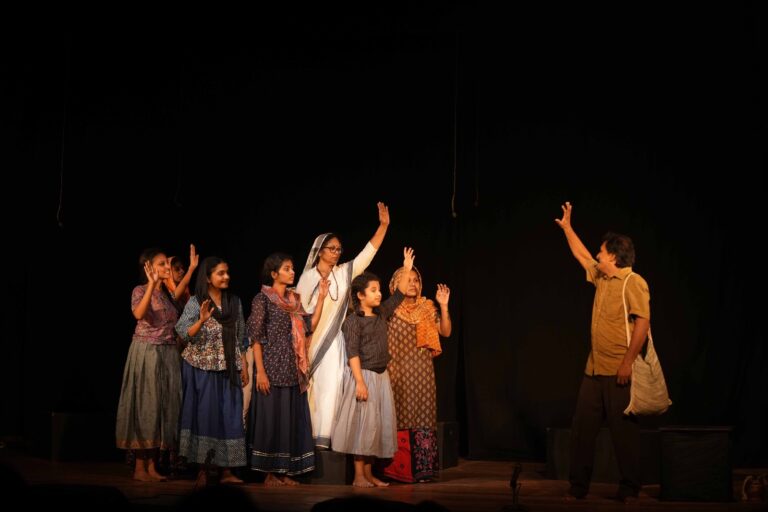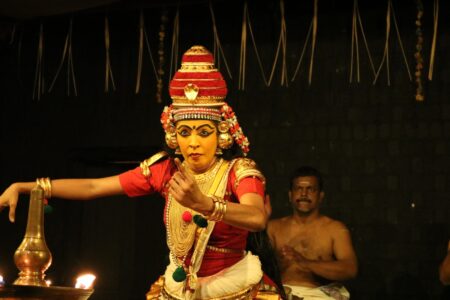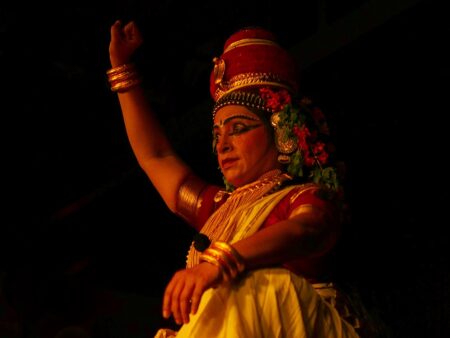Theatre is a powerful tool for transforming the society, culturally and politically. This has been proved in Kerala many a time. Swairitha Prayanam presented by Nataka Souhrudam belongs to this genre.
The iconic social reformer V T Bhattathiripad (VT) turned a legend for his assiduous efforts for the emancipation of the Namboodiri women. His play ‘Adukkalayil Ninnu Arangathekku’ (from kitchen to the stage) was a catalyst for the transformation of these hapless victims of patriarchy, destined to live as slaves inside the smoky kitchen of illams (Home of Namboodiri Brahmins).
The play Swairitha Prayanam staged by the theatre outfit Nataka Souhrudam is based on the checkered life of one such antharjanam (Namboodiri woman) Umade Edathenam who finds mention in one of the writings of VT. Born during the days of freedom struggle, her life extended to 1980s.
A packed audience sat spell-bound in the K T Mohammed Memorial Theatre, Thrissur as the travails of her life unfolded before them through the one-hour-and-a half play.
From Nangema to Aysha
Divided into eight scenes, the play vividly portrays her fight against patriarchy with singular grit and determination. Furthermore, the various names by which she was known during different phases of her life are indicative of the vicissitudes she was compelled to endure.
The first scene gives a synopsis of her life which she narrates to the inmates in the asylum run by her for women, towards the end of her life. Umaben was her name by then. In the subsequent scenes, her life beginning from her marriage to the orthodox Namboodiri Nambyathan, is revealed.
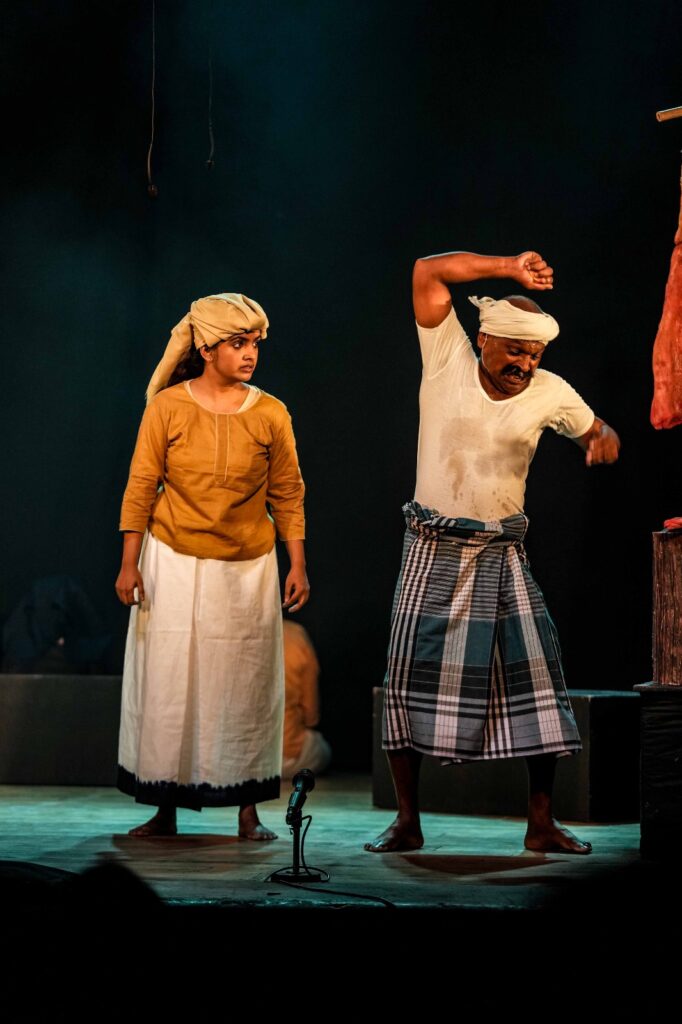
Nambyathan prevents Nangema (her original name) from all progressive activities. She fights against him valiantly, but fails miserably. Finally she is thrown out with her two children, a young boy and a baby girl. She begins a fresh life in a hut. But Nambyathan’s torture continues as he gets the custody of the boy through a court order and the hut is set to flames by his henchmen.
Idon, a Muslim butcher, comes to her rescue and gives her shelter in his home. Converted to Islam, Nangema now becomes Aysha. Soon she realizes the evil designs of Idon. Not only she has to bear a child for him but his sexual advances to her ten-year old daughter transform her into the murderer of Idon. She escapes with her children.
Her next asylum is Wardha Ashram of Gandhiji. Freedom fighter Alex in the Ashram exerts much influence on her. Soon Gandhiji sends Alex to Lahore for organizing the freedom movement and she is persuaded to accompany him. Perhaps it was Lahore that provided her an opportunity for the first time in her life for the realisation of her long cherished ambition – liberation of women.
Soon the day of independence dawned. She believes that independence of the country will pave the way for the freedom of women. But soon communal riots break out and she is forced to leave to Delhi. Women were the major sufferers of all the calamities that followed including the partition. She opens an asylum for the oppressed women in Delhi.
Theoretical brilliance and contemporary relevance
Swairitha Prayanam completes the full circle of events as this was the very asylum in the opening scene where Umaben was seen talking to the inmates. Unni, her first male child who was under the custody of her first husband, now is a youth and he arrives there and compels his mother to return to their native land. But she refuses and asks him to join her efforts for the emancipation of women.
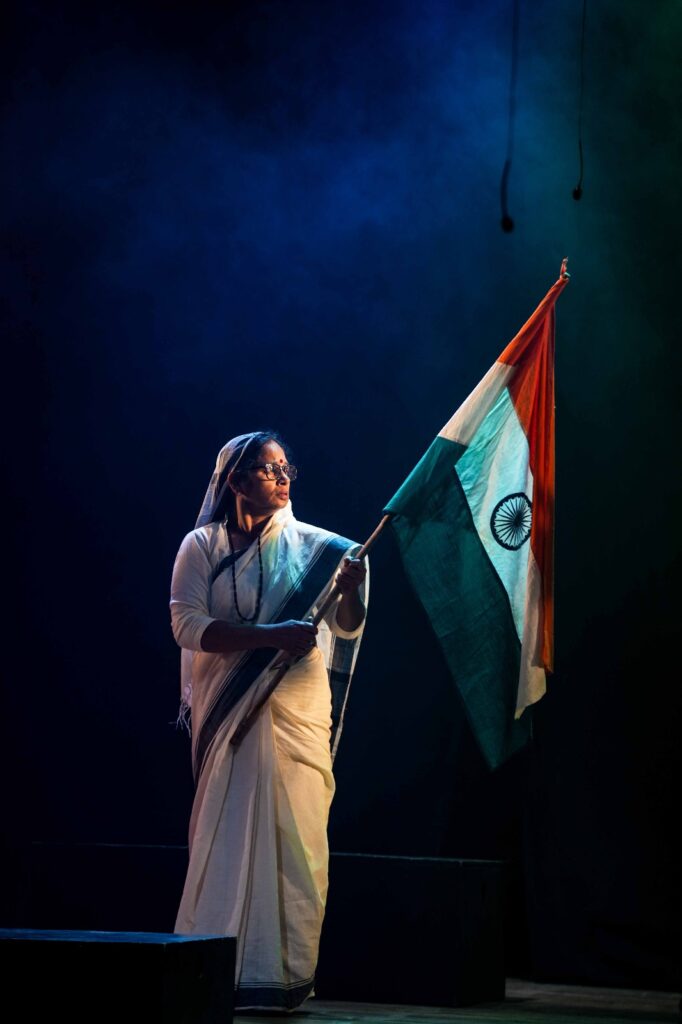
Rema who donned different roles beginning from Nagema has been successful in exhibiting her histrionic potential throughout. Geetha Joseph, Umaben has acquitted herself commendably. So are all the other actors numbering 12 who portray multiple roles. Performance of the child artistes is also noteworthy.
The intricate task of translating V T’s writing into a play has been executed by Adv. M Vinod who is also the director. His directorial skills are evident throughout especially in creating the right ambience of all the venues through varied symbols – masks, actors with palm leaf umbrellas, music including the twelfth Ashtapadi and more. Stage properties are a minimum but have been ingeniously exploited. Further it was a herculean task for organizing the rehearsals as the actors belonged to different walks of life, including school children, working men and women.
As for Nataka Souhrudam, it is a milestone since the organisation is at the doorstep of its silver jubilee. The woman-centric play Swairitha Prayanam assumes much contemporary relevance as woman empowerment still remains a distant dream even after the passing of the Women’s Representation Bill by the parliament.

